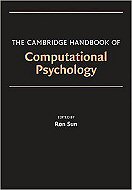|
The Cambridge Handbook of Computational Psychology
|
|
Ron Sun
|

|

This book is a definitive reference source for the growing, increasingly more important, and interdisciplinary field of computational cognitive modeling, that is, computational psychology. It combines breadth of coverage with definitive statements by leading scientists in this field. Research in computational cognitive modeling (or, simply, computational psychology) explores the essence of cognition and various cognitive functionalities through developing detailed, process-based understanding by specifying computational mechanisms, structures, and processes. Given the complexity of the human mind and its manifestation in behavioral flexibility, process-based computational models may be necessary to explicate and elucidate the intricate details of the mind. The key to understanding cognitive processes is often in the fine details. Computational models provide algorithmic specificity: detailed, exactly specified, and carefully thought-out steps, arranged in precise yet flexible sequence. These models provide both conceptual clarity and precision at the same time. This book substantiates this approach through overviews and many examples.
Ron sun is professor of cognitive science at Rensselaer Polytechnic Institute. A well-known researcher in the field of cognitive science, Sun explores the fundamental structure of the human mind and aims for the synthesis of many interesting intellectual ideas into one coherent model of cognition. The goal is to form a generic cognitive architecture that captures the variety of cognitive processes in a unified way and, thus, to provide unified explanations for a wide range of cognitive data. To do so, for the last two decades, he has been advocating the use of hybrid connectionist-symbolic systems in developing cognitive models, and he has been developing theories of human skill learning and human everyday reasoning as the centerpieces of the cognitive architecture.
|
|
